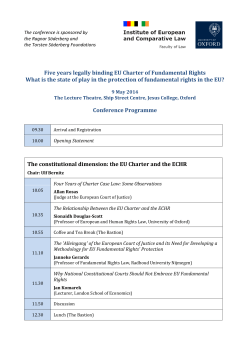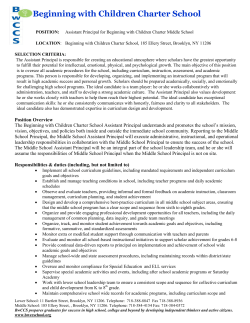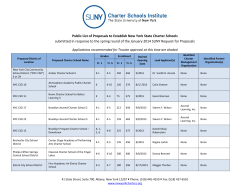
Teacher Voices: Why I Chose a Charter School
A publication of the Association of American Educators Foundation By Erin Fergus JANUARY 2015 EDUCATIONMATTERS Promoting New Standards of Professionalism & Educational Enrichment Teacher Voices: Why I Chose a Charter School I am a 1st-grade teacher at Rowe Elementary School, operated by Northwestern University Settlement, in the West Town neighborhood in Chicago. As a fifth-year charter public school teacher, I have found myself defending my decision to teach in a charter school more times than my 1st graders would be able to count. And trust me, my scholars can count pretty high. As a non-unionized teacher in a city dominated by one of the most influential teachers unions in the nation and where anti-charter school rhetoric is abundant, most people assume I struggled to get a job in a “traditional” Chicago public school and that I “settled” for working in a charter public school. This assumption could not be further from the truth. I chose to work in a charter public school over “As a charter school, we have the freedom to choose curriculum we believe as educators to be rigorous, balanced, and prepares our scholars for high school, college, and beyond.” “As teachers, we are their leaders, their role models, and some of their biggest supporters. We are accountable for their futures, and if high school and college graduation are not being rooted into students minds now, how will they know which footsteps to follow?” a district-run school because I wanted to teach in a school as dedicated as I am to bridging the achievement gap. I went through a rigorous interview process to be accepted as a teacher at Rowe Elementary. As an educator, I was attracted to charter public schools, specifically Rowe, for many reasons. In my 1st-grade classroom, the co-teacher, who is also a certified teacher, and I work hard to ensure our scholars are college and career ready by setting the foundation at the elementary school level. Planning for college at Rowe starts on Day One of kindergarten and is embedded into our core values throughout the school. Unlike many district-run schools, our classrooms are named after colleges and universities, and the kindergarten classes are known among staff as “The Class of 2031”—the year they are expected to graduate college. The values we instill in our scholars are at the core of our mission and surround every decision we make as a nontraditional school. My fellow teachers and school leaders at Rowe Elementary School hold ourselves accountable for the academic, 2 | EDUCATION MATTERS social, and emotional success of our scholars. As a charter school, we have the freedom to choose curriculum we believe as educators to be rigorous, balanced, and prepares our scholars for high school, college, and beyond. At Rowe, we strongly believe in the Common Core State Standards and have adopted curriculum to ensure our scholars’ academic success and we use a social-emotional learning curriculum to teach our scholars the importance of being model citizens. Our administration supports the teachers and allows us the flexibility and creative freedom to teach in a way that is unique to each individual teacher and classroom. Our administration’s presence is felt strongly throughout the building and our rooms. We are given constant feedback on our teaching and receive the support necessary to improve our practice. This continued support positively affects teachers, scholars, and their families. Our test results reflect these efforts and strategies. With this collaborative approach, Rowe ranked in the 75th percentile compared with national benchmarks for student growth in reading and the 80th percentile in math, which is the second-highest math growth percentile of all 15 public elementary schools in the West Town neighborhood. As a charter school, we are continuing to improve our academic, social, and emotional growth of our scholars and to prepare them for a successful future. Some students never have to fight for a quality education and are surrounded with resources and adults who have experience in the college process. I was among these lucky students. My mother, grandparents, aunts, and sisters are all educators, and I followed in their footsteps. However, access to a quality education and a pathway toward college is not a reality for all students. When I look at my scholars, I realize many do not have footsteps that lead them in the direction of college. As teachers, we are their leaders, their role models, and some of their biggest supporters. We are accountable for their futures, and if high school and college graduation are not being rooted into students minds now, how will they know which footsteps to follow? Rowe Elementary School is effective in transforming student lives, and that is why I chose to teach at this charter public school. ■ Erin Fergus is a first-grade teacher at Rowe Elementary Charter School in Chicago’s West Town neighborhood. A version of this editorial was originally published in the Chicago Sun Times in November. About National School Choice Week Quick Facts National School Choice Week 2015 will be held January 25 to 31 and will be celebrated by over 8,000 schools nationwide! During last year’s National School Choice Week: N ational School Choice Week provides an unprecedented opportunity, every January, to shine a positive spotlight on the need for effective education options for all children. Independently planned by a diverse and growing coalition of individuals, schools, and organizations, National School Choice Week features thousands of unique events and activities across the country. The Week allows participants to advance their own messages of educational opportunity, while uniting with like-minded groups and individuals across the country. Participants in National School Choice believe that parents should be empowered to choose the best educational environments for their children. Supporters plan events that highlight a variety of school choice options— from traditional public schools to public charter schools, magnet schools, private schools, online learning, and homeschooling. National School Choice Week is a nonpartisan, nonpolitical public awareness effort. We welcome all Americans to get involved and have their voices heard! • Over 5,500 events were held across all 50 U.S. states & more than 100 events abroad. • The Week generated 3,000+ positive news stories for participating schools & organizations. • 22 governors & 49 mayors issued proclamations recognizing School Choice Week. • F ind school choice weeks in your area at schoolchoiceweek.com/press/media-center today! • Be prepared to celebrate National School Choice Week 2015 by learning the NSCW dance at schoolchoiceweek.com/dance! • Download the School Choice Week Postcard to send to your elected officials! schoolchoiceweek.com/ downloads/NSCW_2015_Legislator_Cards.pdf • Don’t forget to read the School Choice Definition Guide at: schoolchoiceweek.com/images/documents/ School_Choice_Definitions.pdf. ■ JANUARY 2015 | 3 By Dr. Marie A. Bussing Study Spotlight: School Choice Raises Demand for Teachers with Select Characteristics “School choice would raise the demand for teachers with select skills: teachers with a high-caliber college education, with better math and science skills, with a high degree of independence, and those who put forth extra effort.” School choice takes many forms, including charter schools, vouchers, tax credits for private school tuition, and inter-district choice. Historically, teachers’ organizations such as the National Education Association and the American Federation of Teachers have opposed school choice. However, in Would School Choice Change the Teaching Profession? (NBER Working Paper No. 7866), author Dr. Caroline Hoxby finds that school choice would have some notable benefits for the teaching profession. It would raise the demand for teachers with select skills: teachers with a high-caliber college education, with better math and science skills, with a high degree of independence, and those who put forth extra effort all would be in great demand. Certainly, school choice would result in some losers: the less skilled and motivated teachers would find less demand for their services. Hoxby proposes the possibility that school choice ultimately would influence who became, and remained, a teacher by affecting schools’ demand for certain characteristics. To determine which characteristics are demanded more by choice-based schools, she asks which are rewarded with a higher wage and are present in greater abundance. She analyzes data on traditional forms of school choice—selection of a private school and picking a public school by choosing a residence—and on a third form of choice, the charter school. She draws her data on traditional school teachers from a nationally representative random sample of public and private school teachers and administrators. For comparable information on charter schools, Hoxby distributed surveys for administrators and 4 | EDUCATION MATTERS “Overall, the evidence suggests that school choice would require teachers to have higher levels of skills and to exhibit extra effort in return for a higher wage for those characteristics.” “Currently, skilled teachers are more likely to leave the profession early. Hoxby points out that, within a district, teachers with similar seniority and the highest level of college degrees are likely to receive roughly similar wages.” randomly selected teachers from every charter school in operation. The teachers and administrators were queried on a number of topics, including teachers’ pay, required and actual hours of work, teaching experience, college background, and career plans. Overall, the evidence suggests that school choice would require teachers to have higher levels of skills and to exhibit extra effort in return for a higher wage for those characteristics. Specifically, Hoxby discovers that traditional forms of school choice do increase the demand for teachers who were educated at select colleges, who have degrees in a subject (like history or English) as opposed to education, who have good math and science skills, and who are willing to work extra hours in addition to those required. Comparing charter schools to public schools, Hoxby not only finds that charter schools hire more teachers with these characteristics, but also that the incremental return to such characteristics (in terms of pay) is higher at charter schools. (Charter schools pay lower salaries on average than regular public schools do, but charter schools allow pay to vary more with teachers’ characteristics.) For example, public school teachers who graduated from very competitive colleges are paid 3.1 percent more than their colleagues, while charter school teachers from the same group of colleges are paid 6.6 percent more than their colleagues. Charter schools also demand more teachers who have majored in math and science. In the public schools, math and science majors are paid about 4.4 percent more but in charter schools they are paid about 8.4 percent more than their colleagues. In salaries, the average public school teacher earns, $34,690; the average charter school teacher, $32,070; and the average private school teacher, $21,286. Currently, skilled teachers are more likely to leave the profession early. Hoxby points out that, within a district, teachers with similar seniority and the highest level of college degrees are likely to receive roughly similar wages. However, her research suggests that schools that face greater school choice retain skilled teachers longer. This may, of course, be a consequence of such teachers being paid more in districts that face stronger choice-based incentives to pay teachers according to their merit. Hoxby’s research suggests that school choice could change the teaching profession in a way that many potential, and even established, teachers would like. ■ Read the full report at nber.org/ papers/w7866. Dr. Marie A. Bussing holds an M.B.A. and a doctorate of arts in economics. She has been an adjunct instructor at USI since 1991, joining the College of Business as an assistant professor of economics in 2010. Dr. Caroline Hoxby, a professor of economics at Standford University, is the author of the study mentioned above. JANUARY 2015 | 5 Why AAE Supports National School Choice Week T he Association of American Educators supports educators in all settings—traditional public, virtual, charter, or private. We celebrate teacher choices—in education settings and in professional associations! Celebrating Teachers in Choice Settings • Every education setting is a choice. AAE applauds that there are more career options than ever for teachers. • School choice enhances & attracts talented individuals to the education profession. • Choice works for teachers, too! Teachers can now match their vision of education with schools that share the same vision. • AAE has members in all education settings. We support them all & celebrate their professional choices! ■ Free Supplies for AAE Members: Order a School Choice Week Kit As part of our partnership with National School Choice Week, AAE members are invited to join us in celebrating this empowering week by requesting a giveaway kit absolutely FREE! Share these eye-catching yellow fleece scarves, posters, photo placards, and more with friends and students! 6 | EDUCATION MATTERS Use these supplies to reward your star students, to hold an event in your home or classroom, to pose for photos with your students, or to celebrate your school’s success—all while recognizing the importance of opportunity in education! This offer is being made available exclusively to AAE members only and for a limited time. Again, the materials and all shipping are being offered at absolutely no cost to you. • Order materials for a classroom event at schoolchoiceweek.com/aae-schools • Order materials for a home-based event at schoolchoiceweek.com/mymeeting-aae We hope you will join us in shining a positive spotlight on effective education options! Teachers deserve a voice in the school choice conversation! ■ How much do you know about School Choice? Teachers…complete this crossword puzzle and email the results to Alana@aaeteachers.org. All correct entries received by January 15th will be entered into a raffle for an Amazon gift card! Don’t delay, send your entry today! ACROSS DOWN 3.W hat month is National School Choice Week held? 1.Public _________ schools are institutions funded by tax dollars but given the autonomy to make their own rules. 14. These are detailed descriptions developed by a teacher to guide class instruction during a given instructional time. 2.The location, typically in a school, in which a group of students is taught. 16. W hat kind of institutions does Rowe Elementary School name it’s classrooms after? 6. W hat is AAE’s flagship publication called? 7. Did you know there’s a dance for NSCW? What is the official song for 2015? 4. The Association of American Educators provides its members with $2 million in what? 8. Want to share AAE with your colleagues at an upcoming school event? Order an AAE ________ with tons of materials for FREE! 17. W hat is the month of the next AAE Teacher Scholarship and Classroom Grant application deadline? 5. W ho founded AAE? 9. O ne whose occupation is to instruct. 10. A AE only takes policy positions based on what? 12. Th e subjects comprising a course of study. 11. The theme of this months newsletter. 1 13. W hat city will National School Choice Week’s annual kickoff be held this year? 15. Named after Horace Mann, the goal of these is to change the course of public education. Historically, they have taken different forms because the motivations of supporters have differed. 18. W hat is the last name of the author of “Would School Choice Change the Teaching Profession?” 2 3 4 5 6 7 8 19. What kind of curriculum does Rowe Elementary School use to teach their scholars about the importance of being model citizens? 20. This is the fastestgrowing, nonunion teachers’ organization in the nation. 21. This is the holiday where we sing Auld Lang Syne. 9 10 11 12 13 15 14 16 17 18 19 20 21 Created on TheTeachersCorner.net Crossword Maker JANUARY 2015 | 7 The Association of American Educators Foundation 27405 Puerta Real, Suite 230 Mission Viejo, CA 92691-6388 Presorted Standard US Postage Paid #400 Laguna Niguel, CA Education Matters is a publication of the Association of American Educators Foundation (AAEF) aaeteachers.org • editor@aaeteachers.org • 800.704.7799 Gary Beckner, Executive Editor Alexandra Freeze, Managing Editor M. Alana Welch, Coordinating Editor Debbie Brown, Editorial Assistant Diane Meyer, Editorial Assistant Sound Off: Do you have opinions or firsthand knowledge of school choice in action? LET AAE KNOW! What do you think about school choice? Are you a parent benefiting from school choice policy? Do you love teaching in a virtual or public charter school? Do you support open enrollment in your state or district? Make your voice heard. Email AAE with your letters, comments, or articles for consideration in future editions of Education Matters. Email editor@aaeteachers.org with your thoughts! Happy NewYear Teachers! from all of us at the Association of American Educators
© Copyright 2025









